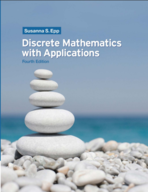Solution Found!
Solution: Use truth tables to determine whether the argument
Chapter 2, Problem 9E(choose chapter or problem)
Use truth tables to determine whether the argument forms in 6-11 are valid. Indicate which columns represent the premises and which represent the conclusion, and include a sentence explaining how the truth table supports your answer. Your explanation should show that you understand what it means for a form of argument to be valid or invalid.
\(p \wedge q \rightarrow \sim r\)
\(p \vee \sim q\)
\(\sim q \rightarrow p\)
\(\therefore \sim r\)
Text Transcription:
p wedge q rightarrow sim r
p vee sim q
& \sim q rightarrow p
\therefore & \sim r
Questions & Answers
QUESTION:
Use truth tables to determine whether the argument forms in 6-11 are valid. Indicate which columns represent the premises and which represent the conclusion, and include a sentence explaining how the truth table supports your answer. Your explanation should show that you understand what it means for a form of argument to be valid or invalid.
\(p \wedge q \rightarrow \sim r\)
\(p \vee \sim q\)
\(\sim q \rightarrow p\)
\(\therefore \sim r\)
Text Transcription:
p wedge q rightarrow sim r
p vee sim q
& \sim q rightarrow p
\therefore & \sim r
ANSWER:
Solution :
Step 1 :
In this problem, we have to construct the truth table and determine the statement is it valid or not.
